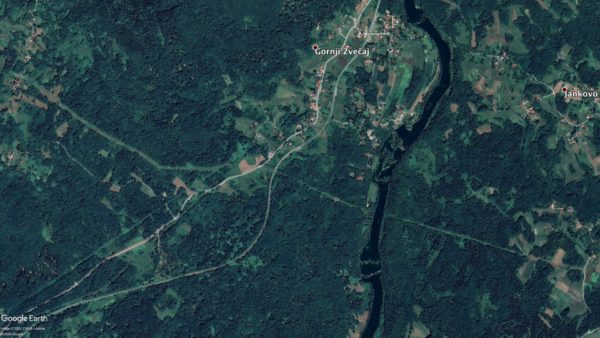The respondent’s group consisted of around 110 people from Afghanistan, Pakistan and Bangladesh. He himself is an Afghan citizen.
The group walked through Croatia for approximately twelve days when they were stopped. The respondent explained that the group made detours and slow progress due to the group leader’s advice.
On the night of the 13th or 14th of November, the group slept in a forest near 23 road, between Gornji Zvecaj and Generalski Stol [45.352677, 15.401469]. At around midnight, two cars arrived, one was a van and the other a smaller vehicle. According to the respondent, the officers – twelve men – came out of the cars, all dressed in grey military uniforms. They also wore grey face masks that only showed their eyes. The respondent describes the officers as very tall and strong. He calls them “commando”, which according to the respondent was also written on the back of their uniform.
By their behaviour, the respondent could identify one group leader – he seemed older than the others and gave commands. The officers fired their guns twice into the sky and shouted out, imitating wolf howls, and screaming out words such as “stop”, “fucking migrants”, and accusing the group members of being mujahideens and terrorists. They directed the whole group towards a small road nearby. The respondent reports seeing the officers bearing wooden sticks taken from the forest and using them in a few instances to make the group follow their instructions.

The group sat by the roadside [45.359066, 15.394999] for what felt like two hours to the respondent. He explains that he was forced to maintain a sitting position covering his ears with his hands, eyes to the ground. Hence, he could not see but from the screaming and moaning of several other people he could tell that they were beaten by officers. He himself did not suffer any physical violence at this point. The respondent states that one man expressed in few words that he wanted to stay in Zagreb, to stay in Croatia. To this, an officer responded by saying “fuck you” and “no Zagreb”. As a result, the respondent explains that no other group member dared to express their intentions.
After what the respondent says felt like two hours, two more vehicles arrived. One of the vans was bigger than the other and both had the word “policija” inscribed on them. Two men in black uniforms, written “policija” on it, came out. The respondent reports that they insulted the group members and made jokes:
“We will bring you to Germany.”
Accompanied by boot kicks, the officers made parts of the group enter the van. In pairs of two, police cars kept coming and taking away group members. The third time a pair of police cars arrived, the respondent was loaded into one of the smaller vans. He explains that people jumped in voluntarily to avoid additional beatings from the officers. Pressed closely together, about 20 men were forced into the van in a standing position. They drove for what felt like multiple hours, according to the respondent. The respondent suggests that the officers intentionally drove in serpentine lines, trying to shake the van and make the people in the back suffer.
When they arrived a few meters away from the Bosnian border [44.710407, 15.924522], the officers made them exit the van. The respondent recalls the sun rising, it was already the early morning. There were other men in different uniforms waiting for them. The respondent remembered seeing two men, but cannot confirm whether there were other officers nearby. He says that they were both dressed in black, wearing black ski masks and black gloves, nothing written on their uniforms. They bore guns, knives, and batons. Everyone had to sit in line. An officer pulled on the respondent’s jacket and jumper, and they were instructed to give them all their personal belongings, which included their jackets, bags, sleeping bags, telephones, valuables, shoes, socks, jumpers. According to the respondent, some of the group members also had to take off and give them their t-shirt. Those people were left with nothing but pants on. He considers himself “lucky” for not being one of them. He did not have a telephone, but he gave away the 20 euros that he had in his jacket pocket, as well as his shoes and socks, his jacket, jumper, his backpack and sleeping bag. A fire was already burning when the respondent’s group arrived at the spot, in close proximity to where the men sat in line. They were forced to throw all their belongings into the fire.
After that, the respondent was part of a group of 20 people forced to cross the border into Bosnia together. They had to walk by an officer that struck each person on the back once or multiple times with a baton. He then yelled at them to “run, run, run”. The group met the street on the Bosnian side of the border and followed it, through the municipality of Lohovo to the crossing with the coordinates [44.714252, 15.925376].
At this point, a Bosnian police car with two officers awaited them. The officers wore black police uniforms. They told the group to walk to Lipa camp. When the group members complained about not having any personal belongings or shoes, the officers assured them that they would get everything in the camp. After that, the car left.
The respondent shares that he has never suffered such treatment from officers before, in any of the countries he has passed through.
“I didn’t see anything like this before. Iran is different. Turkey is different. Bulgaria is different.”
